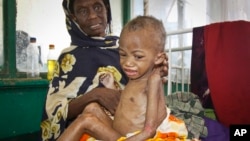The United Nations Food and Agriculture Organization says more than 1 million Somalis are in need of humanitarian assistance, and at least 200,000 children under the age of five are acutely malnourished as drought hits southern and central Somalia.
The U.N.'s food and nutrition analysis agency (FSNAU) warns that the humanitarian recovery and gains made two years ago may be lost as poor rains, a cycle of violence and reduced aid assistance threaten the lives of millions of Somalis.
Agency Chief Technical Advisor Daniel Mola said the people of southern and central Somalia need humanitarian assistance and livelihood support in the next four months as they wrestle with crop failure and conflict.
"Projections indicate that combination of poor rainfall, increased cereal prices as the result of conflict, but also because we had a poor below-average harvest last year and poor harvest prospects this year. So we now have over one million people that are acutely food insecure and need urgent humanitarian assistance until the end of the year," said Mola.
Acute malnourishment
The report also warns more than 43,000 Somali children are at risk of dying from hunger and one in seven under five years are acutely malnourished.
In 2011, the U.N. declared famine in some regions of Somalia after more than a quarter of a million Somalis, mostly children, died of hunger.
Mola called on aid agencies and the international community to respond now before the situation worsens.
"Although there is no imminent risk of famine now, but we should remember that even back 2010-2011, half of the people - an estimated 260,000 people - died before famine was declared in July 2011. So we don't have to wait - donors and the humanitarian community do not need to wait to famine declaration to start responding," said Mola.
Militants block supplies
Since the last crisis, Somali insurgent group al-Shabab has lost ground in the face of a concerted military push by African Union troops and Somali government forces.
In some cases, the group has blocked roads to towns it lost in an effort to cut off incoming supplies.
On Saturday, AU and Somali forces launched an offensive to take more ground from the group in areas it controls, especially the port town of Barawe, the insurgents' last remaining financial hub and the route used to ship weapons.
Late Monday, U.S. forces carried out an airstrike targeting al-Shabab commanders in the Lower Shabelle region as part of the effort to weaken the group's capabilities.
Security observers hope that this time around, humanitarian agencies will be able to access more areas than in 2011, when the militant group controlled much of south and central Somalia, making the work of aid workers more difficult.
